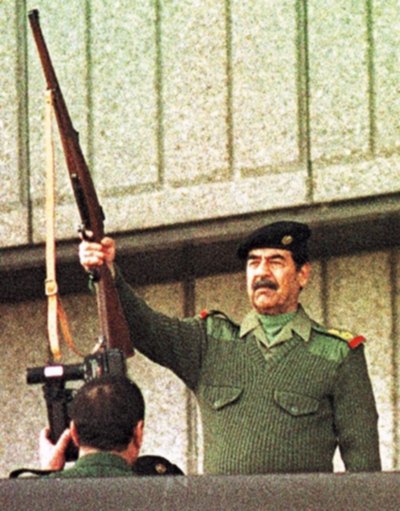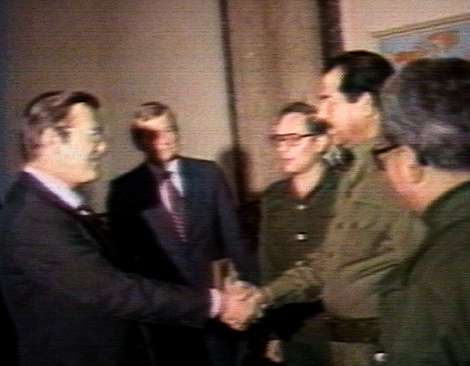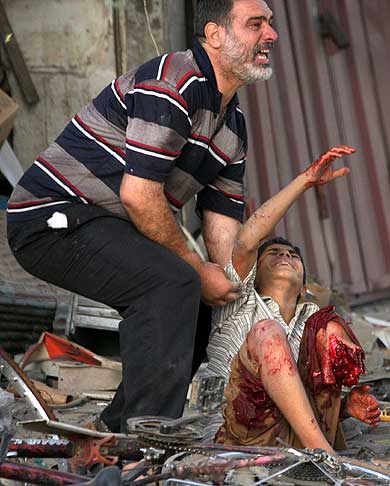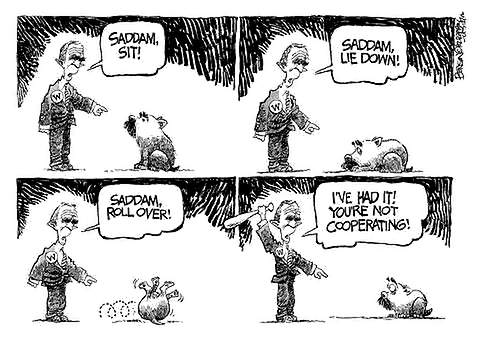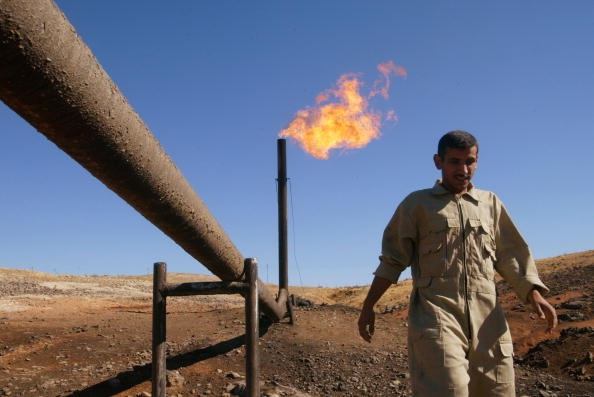|
|
|||||||||||||||||||||||||||||||
|
Iraq: Weapons of Mass Destruction and Civil War
The Republic of Iraq borders with Iran, Jordan, Kuwait, Saudi Arabia, Syria and Turkey. It is the cradle of Middle Eastern civilization, the rumoured location of Babylon and the tower of Babel between the Tigris and Euphrates rivers, and the birthplace of writing. The capitol city Baghdad lies 90 km north of the ancient ruins of Babylon which have been abandoned since the 2nd century BC. The Great Ziggurat of Ur (widely regarded to be tower of Babel) lies another 100 km to the south east in the ruins of the city of Ur. The last monarchy of Iraq was the Hashemites which were overthrown by a military coup in 1958 and put Brigadier General Abdul Karim Qassim in power who was pro-Soviet Union. Karim Qassim was later overthrown in 1963 by Colonel Abdul Salam Arif and his brother Abdul Rahman Arif later took over power in 1966. In 1968 the Ba'ath Party overthrew Rahman Arif, a coup orchestrated by Ba'ath leader Abdul Salam Arif and Saddam Hussein with help from the American CIA who sent a six man squad to help depose of Rahman Arif. Saddam Hussein was a bulwark of secularism and stability against the communists and took power in 1979 after killing/arresting all of his political rivals. Hussein was not religious, believed strongly in Westernization and modernization and built a reputation as a progressive, effective and sometimes brutal politician.
Hussein established the "National Campaign for the Eradication of Illiteracy" and "Compulsory Free Education in Iraq", granted free hospitalization to everyone and gave subsidies to farmers. His health efforts earned him an UNESCO award for making the most modern health system in the Middle East. To pay for all of this he seized control Iraq's oil sector in June 1972, which was a factor in the 1973 energy crisis. Using the oil revenue Hussein also brought around an era of construction, building roads, infrastructure, public buildings, palaces and promoted mining, the arts and Iraq's archaeological digs. Iraq's economy grew rapidly during the 1970s and 1980s with industrial expansion, universities and Hussein created a "carrot and stick" welfare program which was highly successful in getting people off welfare, learning skilled jobs and contributing back to the country. Saddam Hussein also annoyed Islamic conservatives by giving women added freedoms and offered them high-level government and industry jobs. Women were allowed to attend university, become doctors and lawyers and enter politics. Saddam also abolished Sharia law, except for personal injury claims. In 1979 the Iranian Revolution (also called the Islamic Revolution) under the leadership of Ayatollah Ruhollah Khomeini seized control of Iran, creating a conservative Shi'ite state. This was a dangerous idea for Iraq as Saddam Hussein was a Sunni Muslim and believed in religious moderation. In 1980 Hussein claimed that Iranian forces was attempting to overthrow his government and declared war on Iran.
During the Iran-Iraq War the United States provided Iraqi forces with chemical weapons and guns which they used to attack Iranian soldiers and civilians. Meanwhile the United States sold chemical weapons to Iran, playing both sides for fools. In 1988 Saddam Hussein ordered a poison gas attack on the Kurdish town of Halabja for their support of Iran. The Human Rights Watch (HRW) defined the attack as an act of genocide and the bad press made both Iraq and the United States' support of Iraq look bad. Afterwards the USA followed a policy of containment and the Iran-Iraq war ended the same year in a stalemate. In 1990 following the economic chaos of the war Saddam Hussein found out that neighbouring Kuwait was stealing Iraqi oil and selling it the United States and other western countries. Iraq invaded Kuwait and Saddam Hussein declared Kuwait was now part of Iraq, an act which enraged the United States and cut them off from a cheap oil supply.
The United Nations passed sanctions against Iraq and demanded the withdrawal of Iraqi troops from Kuwait. With heavy pressure from the United States the UN Security Council voted for military action against Iraq, authorizing "all necessary means" to "restore international peace and security in the area." The United States and coalition forces entered the war with more advanced weaponry than that of Iraq and quickly defeated the Iraqi army in a mere seven months. Iraq's army was one of the largest and best armed forces in the Middle East at the time, but they were sorely outmatched and outnumbered for what was largely an air war over Kuwait. In the end Saddam Hussein removed his troops from Kuwait, but not before setting fire to all the oil wells as retribution for Kuwait's thievery. At the end of the war coalition forces decided to go home and then US president George H. W. Bush had a choice to make: Overthrow Iraq and try to occupy the country, or go back home? Bush chose the latter because of the economic consequences of trying to continue a war that the American public had no interest in paying for. In return for peace Iraq agreed to accept "no-fly zones," dismantle all chemical and biological weapons it possessed, and end any attempt to create or purchase nuclear weapons. UN weapons inspectors would evaluate the dismantlement of such weapons and Iraq would face economic sanctions if they disobeyed. Shortly after the war Shi'ite muslims staged several protests against Saddam Hussein, but he responded by sending in the army to violently repress such actions and these protests quickly dissolved. In 1993 a plot was discovered to assassinate US President George H. W. Bush and in 1998 Iraq threw out several weapons inspectors accused of being CIA spies. President Bill Clinton imposed sanctions on Iraq and started a four-day bombing campaign named Operation Desert Fox in December 1998 aimed at undermining Saddam Hussein's control over Iraq. An estimated half million Iraqis died of starvation and disease due to the economic sanctions, but this was nothing compared to the millions who died during the Iraq War following the March 20th 2003 invasion by American and British forces plus a "coalition of the willing". George W. Bush justified the invasion by claiming that Iraq had developed weapons of mass destruction and stating a desire to remove an oppressive dictator from power and bring democracy to Iraq. "Iraq continues to flaunt its hostilities toward America and to support terror. The Iraqi regime has plotted to develop anthrax, and nerve gas, and nuclear weapons for over a decade... This is a regime that agreed to international inspections — then kicked out inspectors. This is a regime that has something to hide from the civilized world... By seeking weapons of mass destruction, these regimes pose a grave and growing danger. They could provide these arms to terrorists, giving them the means to match their hatred." - George W. Bush, President of the United States.
To further this idea the White House used hypothetical images of what they thought Weapons of Mass Destruction might look like and images of the chemical weapons the United States gave Iraq during the Iran-Iraq war. There was no doubt that Iraq had once had chemical and biological weapons because the USA gave those weapons to Iraq in exchange for oil. The majority of those same weapons had an expiry period of 5 years, meaning after a 5 year period the chemicals inside broke down and became useless. The Bush administration also made a number of wild allegations against Iraq, including that Iraq was acquiring uranium from Niger (nuclear weapons use weapons grade plutonium, not uranium) and that Iraq had secret weapons laboratories in mobile trailers and isolated underground facilities throughout Iraq. The United States re-deployed most of their troops from Afghanistan to make up a shortage of troops available to send to Iraq. Strong anti-war protests in the USA and questions about legitimacy of a preemptive war about bogus WMD resulted in a poor public opinion of the Iraq War both in the United States and abroad. Following the events of September 11th 2001 the United States had the aid of many countries around the world, but George W. Bush's decision to push his "war on terror" into an unprovoked war on Iraq caused that support to evaporate and has forever tarnished the United States' reputation as a fair democracy.
No weapons of mass destruction were ever found, but quite a few weapons of small destruction have been used since American and British troops since the war began, mostly in the form of roadside bombs and suicide bombers. Saddam Hussein went into hiding during the war but was later found and captured on December 14th 2003. Saddam Hussein was tried for genocide and other war crimes, convicted and hung December 30th 2006. The execution was carried out at "Camp Justice," an army base in Kadhimiya, north east Baghdad and was videotaped on a cellphone. The video was almost immediately released on the internet, sparking global controversy about whether he should have been kept alive for potential information and public relations. The biggest change in Iraq is the civil war that has broken out between moderate Sunni and conservative Shi'ite Muslims with both sides attacking the other side with suicide bombers, car bombs, grenades, rocket launchers and highly planned attacks on civilians. The goal? Control of Iraq's religious and political future. In Northern Iraq the Kurds have practically built their own country known as Iraqi Kurdistan. It borders Iranian Kurdistan to the east, Turkish Kurdistan to the north, and Syria to the west. The push for an united Kurdistan however is annoying both Iran and Turkey, two countries with vested interests in keeping Iraqi Kurdistan as part of Iraq. The Turkish army is responsible for burning almost 3000 Kurdish settlements and displacing two million people.
Iraq's oil dominated economy is now booming largely due to American investment and the building of oil pipelines for transporting oil to Europe and Asia. Iraq's GDP grew 5% to $102.3 billion in 2007 and oil exports are growing due to demand in India and China. Record high oil prices in 2008 are expected to boost Iraq's GDP by approx. 20% in 2008. 84% of Iraq's exports is oil and 46.8% of their exports goes to the United States. Italy, Spain and Canada are Iraq's next biggest trading partners. Iraq's electricity grid is fueled by burning oil (renewable energy accounts for less than 1.6% of Iraq's electricity usage). Iraq's government is currently operating on $6.1 billion annual budget deficit and is borrowing from Chinese banks to make up the shortfall. A proposed oil pipeline from Iraq, through Iran and Afghanistan to China will do much to increase Iraq's oil exports in the coming decade. Statistical Source: The CIA World Factbook.
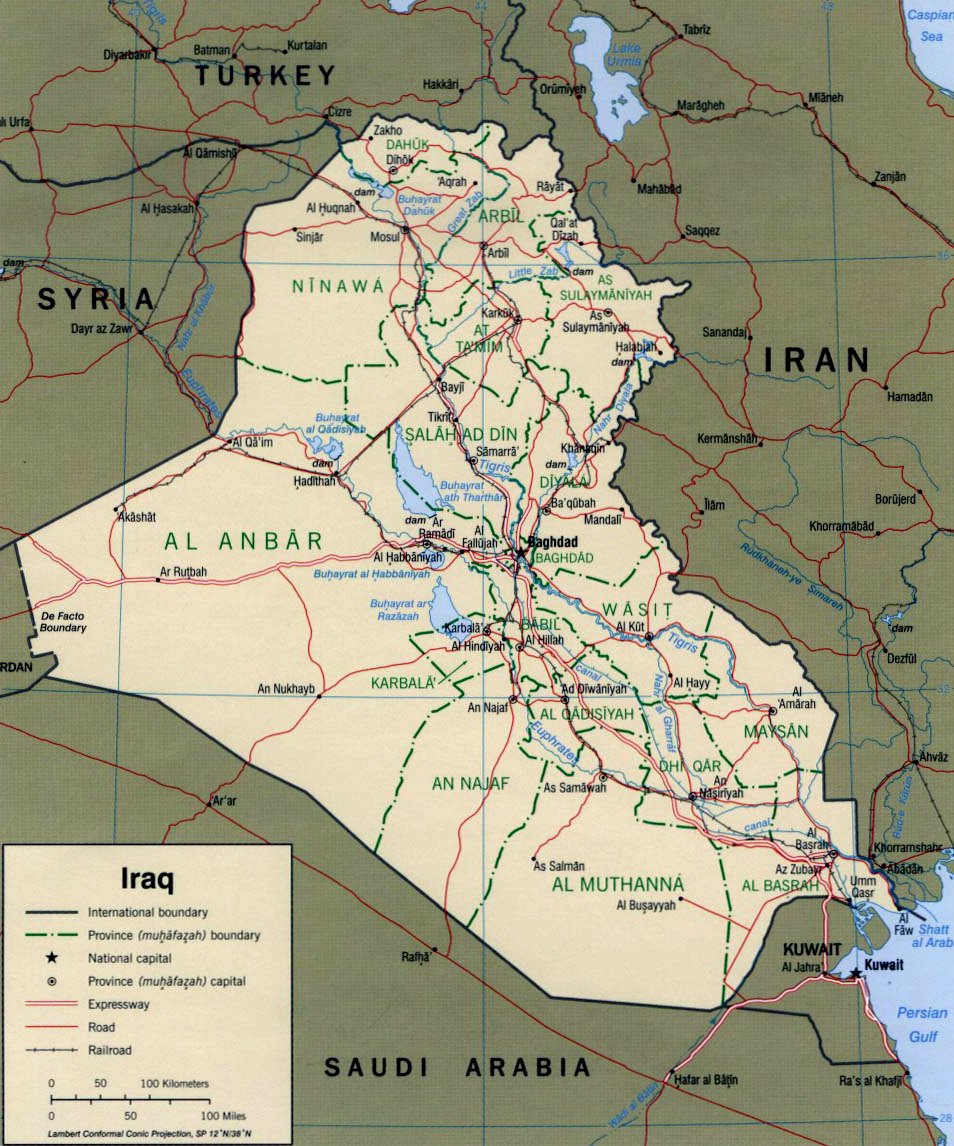
|
|
||||||||||||||||||||||||||||||
|
Website Design + SEO by designSEO.ca ~ Owned + Edited by Suzanne MacNevin | |||||||||||||||||||||||||||||||
